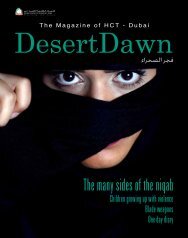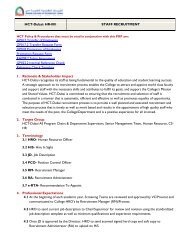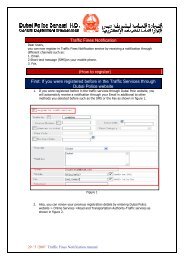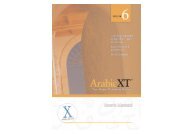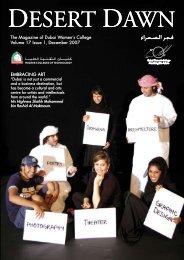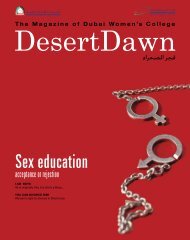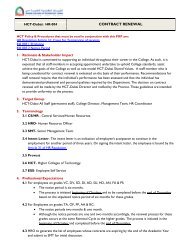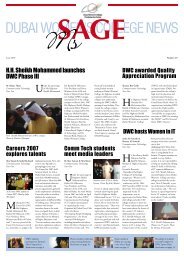The unrevealed trauma - Dubai Women's College - Higher Colleges ...
The unrevealed trauma - Dubai Women's College - Higher Colleges ...
The unrevealed trauma - Dubai Women's College - Higher Colleges ...
Create successful ePaper yourself
Turn your PDF publications into a flip-book with our unique Google optimized e-Paper software.
28 29<br />
the UAE still managed to be<br />
among the top countries in GDP<br />
ranking.<br />
Abu Dhabi and <strong>Dubai</strong> control<br />
83.2 percent of the country’s<br />
wealth; they are the largest suppliers<br />
and producers of oil. This<br />
uneven distribution of economic<br />
development in the UAE makes<br />
some Emirates poorer than<br />
others. <strong>The</strong> other five emirates<br />
comprise only 6.9 percent of<br />
the country’s wealth, creating<br />
dependence on the federal<br />
government for financial support.<br />
Causes of poverty differ from one<br />
country to another. One of the<br />
main causes in the UAE is society’s<br />
focus on image. As an example,<br />
most individuals in an Emirati<br />
family own their own cars. Mostly<br />
they buy high standard cars and<br />
don’t mind applying for a loan to<br />
own such cars. Ministry of Social<br />
Affairs research points to ‘high<br />
standards’ as the most common<br />
factor of the impoverished, followed<br />
by the cost of living. People would<br />
not be living in poor conditions if<br />
a luxurious life had not been one<br />
of their priorities. Ninety-eight<br />
percent of families getting help<br />
from the Red Crescent have loans<br />
that leave them unable to pay for<br />
the essentials of living.<br />
Many families know they are<br />
eligible for help from specialized<br />
foundations. <strong>The</strong> main reason<br />
they do not ask for help is shame;<br />
they think it is embarrassing.<br />
Pride and dignity stop them from<br />
asking for the aid they need.<br />
<strong>The</strong> UAE has no official published<br />
research regarding people living<br />
under the poverty line. <strong>The</strong> only<br />
available statistics go back to<br />
2008, prior to the economic crisis.<br />
A well-known Emirati organization<br />
studies the poverty in the<br />
country annually, but does not<br />
provide research results for the<br />
public. When asked to provide<br />
research findings, they said it<br />
was confidential.<br />
NINETY-EIGHT<br />
PERCENT OF<br />
FAMILIES GETTING<br />
HELP FROM THE<br />
RED CRESCENT<br />
HAVE LOANS THAT<br />
LEAVE THEM<br />
UNABLE TO PAY FOR<br />
THE ESSENTIALS<br />
OF LIVING.<br />
“<strong>The</strong> ministry is working on<br />
research to come up with detailed<br />
statistics about poverty in the UAE<br />
which will be available by the<br />
end of 2011,” said Abdulsamad<br />
Al Kamali, coordinator at Social<br />
Security Administration, Ministry<br />
of Social Affairs. All studies verify<br />
that there are no individuals living<br />
within the global poverty line in<br />
the UAE. Dr. Faris Abdulrazak,<br />
chief economist of the <strong>Dubai</strong><br />
Economic Council says, “construction<br />
workers have the lowest<br />
salaries in the country; however,<br />
they earn more than Dh5,500 per<br />
year which is the global standard<br />
of poverty according to <strong>The</strong> World<br />
Bank.”<br />
“An individual whose salary is<br />
Dh1250 or less can get help from<br />
the government. <strong>The</strong> Ministry of<br />
Social Affairs contributes to individuals<br />
by helping them financially<br />
starting from Dh625,” Al Kamali<br />
explains. Low salaries are not the<br />
only factor the Ministry<br />
considers. <strong>The</strong>re are different<br />
categories the government uses<br />
to determine when to help those<br />
in need, so all residents get the<br />
food they need to survive. However,<br />
these families will still be<br />
considered poor according to<br />
the Emirati standards of living.<br />
<strong>The</strong> UAE’s Federal Law No. 2 of<br />
2001 regarding Social Security<br />
Law states that widows, orphans,<br />
special needs, elderly, divorced<br />
and some other groups can legitimately<br />
receive financial aid from<br />
the government. <strong>The</strong>re are rules<br />
that apply before helping needy<br />
families. Specialized centers look<br />
at the income, the properties they<br />
own, the ratio of family members<br />
to rooms, rent cost and health<br />
status.<br />
<strong>Dubai</strong> Economic Council has<br />
listed different standards in<br />
measuring poverty in the UAE.<br />
“<strong>The</strong> council studied the minimum<br />
acceptance within the<br />
society,” Dr. Faris explains. Each<br />
country has different principles<br />
of living, and this is what was<br />
considered before coming up with<br />
a poverty line for the country.<br />
<strong>The</strong> results show that out of 16.9<br />
percent of the poor residents, 7.2<br />
percent are Emiratis. People living<br />
under Dh80 a day are considered<br />
poor according to the standards<br />
of living, which is Dh2400 per<br />
month. This amount for a family<br />
of six –the average Emirati family<br />
- is not enough to fulfill basic needs.<br />
Food, petrol, electricity, water and<br />
other items are daily life expenses.<br />
<strong>The</strong> federal or local government<br />
supports nearly 27 percent of<br />
Emiratis. Help can be provided<br />
as part of the citizens’ salaries;<br />
in addition to their basic salaries,<br />
some people receive money for<br />
house rent and school fees for<br />
their children. “Other than my<br />
basic salary, the company I work<br />
for pays for my kids’ education,<br />
health insurance and part of my<br />
house rent,” says Saeed Mohammed,<br />
an Emirati father of four.<br />
“With the high cost of living, it<br />
would be hard for many householders<br />
to provide their family<br />
with an average lifestyle without<br />
the help of the government.”<br />
Apparently, if the government<br />
stopped helping their citizens,<br />
poverty in the country would rise<br />
by 21 percent in <strong>Dubai</strong> and double<br />
in Sharjah according to <strong>Dubai</strong><br />
Economic Council. This means<br />
that the help Emiratis get plays<br />
a large role in reducing the cost<br />
of living.<br />
THE UAE HAS<br />
NO OFFICIAL<br />
PUBLISHED<br />
RESEARCH<br />
REGARDING<br />
PEOPLE LIVING<br />
UNDER THE<br />
POVERTY LINE.<br />
Bait Al Khair Society states that<br />
17 thousand Emirati families need<br />
help from the government. <strong>The</strong><br />
UAE has people living in poor<br />
conditions, but not yet at the<br />
global poverty line. <strong>The</strong>re are good<br />
intentions from the government,<br />
either by specialized foundations<br />
or ministries. Economists, however,<br />
generally agree that poverty<br />
in the UAE does not represent<br />
a massive problem especially<br />
because both the community and<br />
government are working<br />
together to help reduce<br />
the percentage of poor.<br />
<strong>The</strong> Bait Al Khair Society has<br />
4,868 families registered to receive<br />
help. More than 50 percent<br />
of these families receive help<br />
because of their low incomes. <strong>The</strong><br />
remaining amount of the financial<br />
aid is distributed among different<br />
categories.<br />
All official information that is<br />
available shows that there are a<br />
few poor Emiratis in the country.<br />
<strong>The</strong> help they receive from the<br />
government improves their standard<br />
of living. Different authorities<br />
state different facts; some say that<br />
loans and high standards of living<br />
are the two causes of poor financial<br />
conditions. Other foundations say<br />
that most of the people that need<br />
help are low income. All foundations<br />
avoid giving or officially<br />
stating that they conduct annual<br />
research regarding this issue. All<br />
they could provide were statistics<br />
from before the economic crisis.<br />
<strong>The</strong> question is, do we have<br />
research on the status of poverty<br />
in the country in the past three<br />
years? And, if yes, why isn’t it<br />
made public?<br />
Aiming for an expensive car. Fatema Al<br />
Kamali/DWC



